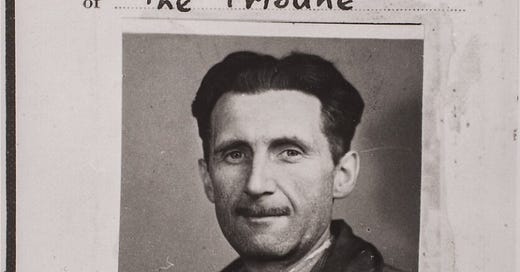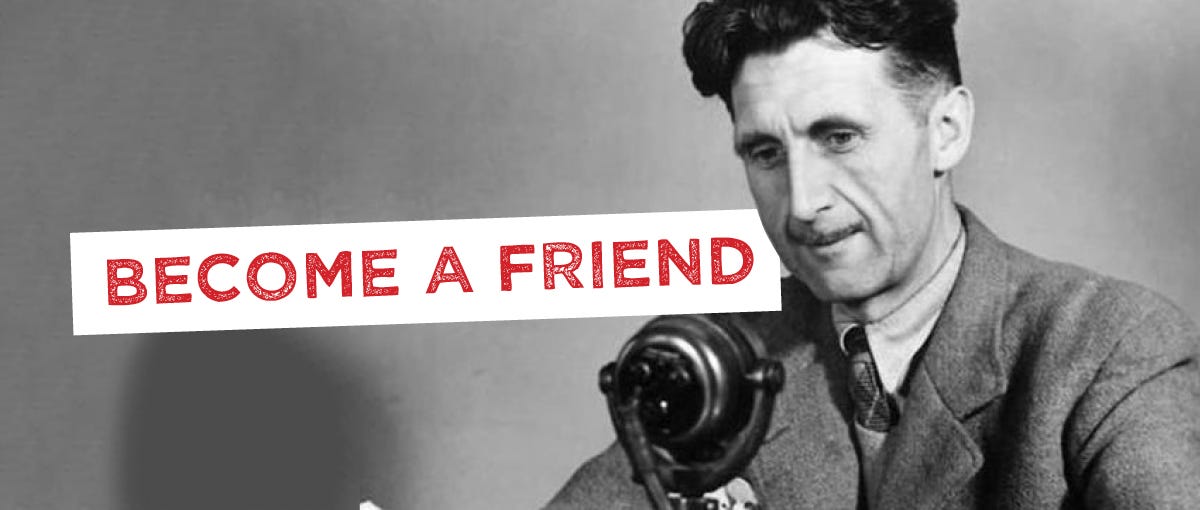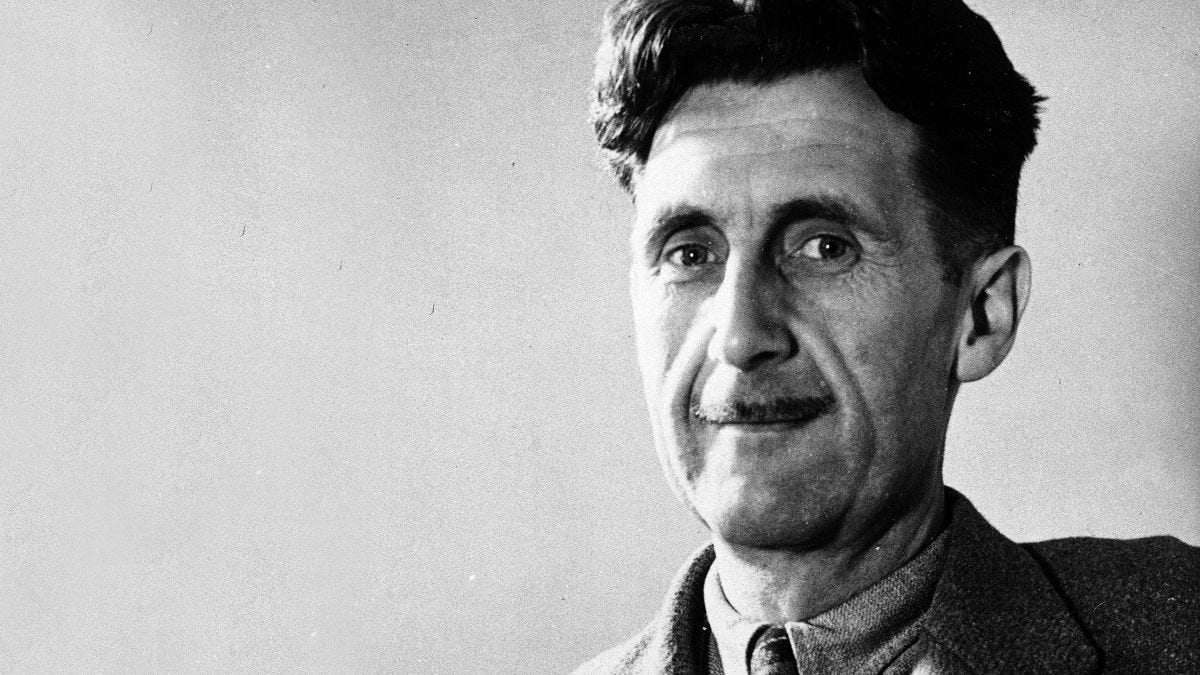“To the past, or to the future. To an age when thought is free. From the Age of Big Brother, from the Age of the Thought Police… greetings!”
Dear Friends,
In the months before he died, with debate raging about the meaning of Nineteen Eighty-Four, Orwell’s publishers released a statement to the press. "The moral to be drawn from this dangerous nightmare situation is a simple one”, it read. “Don’t let it happen. It depends on you."
Of course, it wasn’t so simple. This year marks the 75th anniversary of Orwell’s death at University College Hospital. His reputation has arguably never been higher, more important - or more contested. So, what was Orwell’s final warning? And what does his legacy mean today? Just some of the questions we asked Sandra Newman, D. J. Taylor and Jeff Wasserstrom last month - watch the full video here.
Elsewhere our Director, Professor Jean Seaton, shared her personal list of the ten most common shibboleths surrounding Orwell’s life and work with The Telegraph: scroll down to read an extract, as well as all the latest news from our prizes and programmes.
The Orwell Foundation team
“What I have most wanted to do… is to make political writing into an art.”
The Orwell Prizes are the UK’s most prestigious awards for political writing and reporting - and their reputation is global. We are currently inviting entries for both The Orwell Prize for Journalism and The Orwell Prize for Reporting Homelessness (deadline 31 March 2025). Visit our website for more details.
Entry to The Orwell Prizes for Political Writing and Political Fiction is now closed. Shortlists in all four categories, will be announced in May, ahead of the announcement of the winners at our Prize Ceremony on 25 June 2025.
OYP feedback deadline approaching!
It’s been a busy start to the year for the Youth Prize, as we welcome our new Youth Prize Manager Sam Taylor Hill. Sam has a very special connection with The Orwell Youth Prize - as our inaugural winner in 2015. We're delighted that he's back.
Far more than just a prize, and rooted in Orwell’s values, our resources and events support young people at every stage of their writing, from conducting their own research to finding a form. Uniquely, we also offer personalised feedback to all entrants who submit their work by the deadline of 5 March.
This January, we visited the University of Sunderland, where over 100 local students braved the stormy weather for an inspiring day of Orwell-themed writing and journalism workshops. They also went home with free copies of Orwell’s essays, signed by Orwell Society Chair Quentin Kopp…
The Orwell Youth Prize invites entries from students at school or college in the UK, but we are particularly interested in making new connections in the United States: if you would like to help us expand our model abroad, please get in touch.


Support our work
The Orwell Foundation exists to perpetuate George Orwell’s legacy, celebrating his values of integrity, decency and fidelity to truth. Through our stimulating events, career-shaping prizes, innovative Youth Prize and wide range of free resources, we shine a light on brave writing, uncovering hidden lives and uncomfortable truths.
Join as a Friend or Patron today to support our work. All our supporters receive exclusive benefits, including complimentary tickets and a copy of our annual anthology. join a growing community of supporters dedicated to promoting and furthering Orwell’s legacy, in the UK, the US and around the world.
From our sponsors
“What people would like is a culture of mutual respect.” - Sunder Katwala
In this month's featured article, former Orwell Prize judge Sunder Katwala discusses his approach to issues around immigration, identity, and race in the UK.
is the leading academic journal for analysis, insight and informed opinion on politics and public policy in the UK and globally. In addition to their essential journal, lively and insightful blog and selected events on key issues in politics and public policy, PQ are the founding sponsors of The Orwell Prizes.For more highlights from PQ, subscribe to their newsletter here on Substack.
“Why everything you thought you knew about George Orwell is wrong”
Professor Jean Seaton writes in The Telegraph
“To see [Orwell] as a man who thinks just like us is to miss out on almost everything that makes him so particularly himself. So: here are ten things we – perhaps you – often get wrong about Orwell, his life and his writing.”
Orwell was a freedom-of-speech fundamentalist
“He certainly wasn’t. He fought fiercely for freedom of speech, but was no libertarian. The most famous line in Nineteen Eighty-Four is “Freedom is the freedom to say that two plus two make four. If that is granted, all else follows.” This may seem to be about freedom of speech, but it’s a statement about verity. It is the freedom to declare self-evident truths, facts – not, say, to make a mad allegation about Jess Phillips.
Orwell, in fact, never defends the “right to say anything”. On the contrary, he’s all too aware of the insidious power of corrupted and hateful speech, how it can create horror. The “two minutes’ hate” viscerally shows how violent language will disinhibit people and serve as the precondition for cruelty. This isn’t an abstract “hate”: it leads directly to the mobs who attack innocent people in Trafalgar Square later in the novel. Words, for Orwell, matter more than anything.”
Orwell was the arch-enemy of the ‘deep state’
“Rubbish. Orwell was opposed to totalitarian terror, and as such, he certainly saw bureaucracy as potentially stifling in the hands of tyrants. Drawing on what he saw from the two great “-isms” of his time – fascism and communism – he showed in Nineteen Eighty-Four how systematised lying can provide an order of its own. His work was a kind of prophylactic: read this and beware.
But he was completely in favour of good government, and saw the state as the organiser of law and order. Nineteen Eighty-Four describes an arbitrary world of power and fear and the subversion of reality, with no accountability. Its author wanted better government; even as a young man… he was ruminating, however naively, on what a policy to employ the homeless might look like.”
Orwell wasn’t really a socialist
“Orwell wasn’t anti-communist: again, he was anti-tyranny – not the same thing. It’s true that his work, slung on balloons and flown into North Korea and Poland during the Cold War, was used by the CIA, and reprinted on clandestine presses by brave oppositions. Unlike many of his more fashionable contemporaries, he’d had a long inoculation against the lies and terrors of Stalinist tyranny. But he was himself a socialist – just one who didn’t fit easily into party lines. He was as radical on the day he died as when he tramped the streets of Paris and London as a young writer to experience poverty in the flesh.”
Some housekeeping…
As you may have noticed, we’ve moved our newsletter to Substack, which means all your Orwell News is now in one place.
In addition to our monthly newsletter, expect new writing on Orwell’s life, work and legacy, as well as highlights from our prize-winning writers. And if you haven’t already, remember to subscribe to Orwell Daily for curated emails from Orwell.









